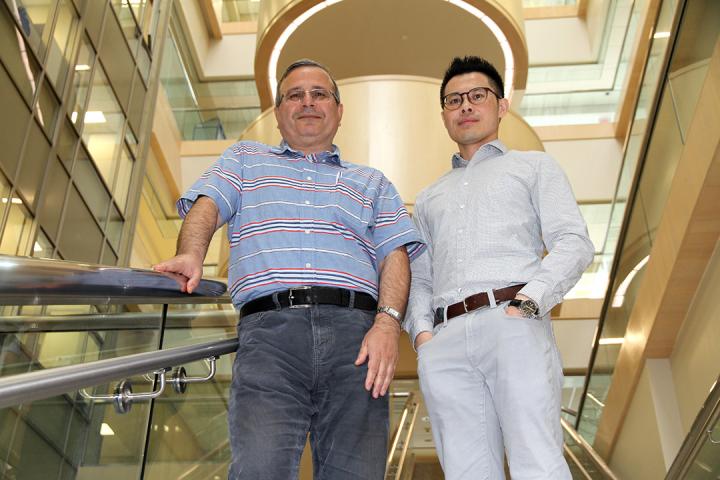
Credit: James Shewaga, University of Saskatchewan
Concussion symptoms–such as loss of balance, hazy comprehension, sleep disturbance and ability to walk straight–can be reversed by a new type of magnetic stimulation, research at the University of Saskatchewan (USask) shows.
Magnetic stimulation using a laptop-style device for 20 minutes per day improved the ability of rodents with concussion to walk in a straight line, navigate a maze, run on a wheel, and perform cognitive tests, according to research published in the Journal of Neurotrauma.
“Concussion is a major health concern effecting all sections of society from children whose brain is still developing to older people suffering falls,” said Professor Changiz Taghibiglou, who led the research. “The beauty of this therapy is not only that it is effective, but that it is non-invasive, easy to use and cost-effective.”
The USask team also found evidence that Low Frequency Magnetic Simulation could potentially protect the brain from future degeneration, a risk following serious concussions.
Concussion or mild traumatic brain injury (mTBI) is a major public health concern and can be caused by sports injuries, motor-vehicle accidents, falls and other head trauma.
The World Health Organization (WHO) estimates that more than 10 million people per year are affected by a traumatic brain injury (TBI).
In Canada, 160,000 people suffer from brain injuries annually, with over 1.5 million Canadians living with the consequences. Income lost from disabilities related to brain injuries in Canada is predicted to rise from $7.3billion to $8.2 billion between 2011 and 2031.
Concussion can also cause severe headaches and hamper a person’s ability to think straight and perform day-to-day tasks.
Within four days of treatment, rodents with repeated concussion had their ability to perform a variety of cognition and motor tests restored to almost normal levels. Their bodyclocks, governing sleep patterns, which can be thrown out of sync by concussion, were also restored to their normal function.
In the next stages of the research program, the USask team plans to conduct longer-term tests on rodents, followed by human trials.
The mice were exposed to low levels of magnetic stimulation, which mimic the way brain waves oscillate.
Mice with concussion that had not been treated were unable to perform the behavioral and neurological tasks, which included running on a wheel without falling off.
Taghibiglou also found that certain proteins, which are important to protect the brain from various neurological conditions, were restored to their normal level by the low-frequency magnetic stimulation. The proteins protect neurons and halt the progression of post-concussion inflammation and neurodegeneration.
Children and adolescents are particularly vulnerable to adverse effects of brain injuries as their brains are still developing into their early 20s.
“Traumatic brain injury is a clinical condition that poses significant challenges to patients, families and health professionals,” said Dr. Yanbo Zhang (M.D), professor of psychiatry in USask’s College of Medicine, and co-author of the paper.
“Patients can suffer long- lasting cognitive impairments, emotional and behavioural changes. Currently, we do not have effective treatment to improve the cognitive impairment. Low frequency magnetic stimulation provides a novel option for concussion treatment. It is portable, non-invasive and affordable.”
###
The brain injury research was funded by Canada’s Department of National Defence, the Saskatchewan Health Research Foundation, and the College of Medicine ComRAD fund.
Media Contact
Jennifer Thoma
[email protected]
Related Journal Article
http://dx.




